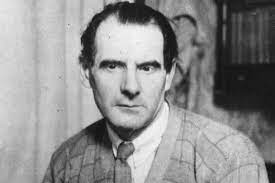Abbey Theatre directors and co-founders William Butler Yeats, 58, and Lady Augusta Gregory, about to turn 72, have high hopes for this new kid.
Last April they premiered the first play by Sean O’Casey, 43, The Shadow of a Gunman, about the country’s recent war for independence from the British. A big hit, they have mounted five more productions of it since.

Sean O’Casey
Tonight is the first performance of O’Casey’s latest, Juno and the Paycock, about last year’s Irish civil war. Yeats and Lady Gregory feel this is going to be another winner for O’Casey and the theatre.
Yeats has been impressed with O’Casey’s work. Although, after a reading of this play, when he compared it to a Dostoyevsky novel, Augusta admonished him—in front of the actors—
You know, Willie, you never read a novel by Dostoyevsky.”
Some of the best Abbey theatre regulars are on stage tonight. Sara Allgood, 43, creating the character of Juno; her frequent co-star Barry Fitzgerald, who turns 36 next week, as Captain Jack Boyle, and Fitzgerald’s brother Arthur Shields, 28, as Boyle’s disabled son, Johnny.

Juno and the Paycock program
Fitzgerald gets to sum up the drama with the play’s last line,
Th’ whole worl’s in a terrible state o’ chassis.”
Yeats is already thinking that this is one time they should extend this run well beyond the usual one week.
“Such Friends”: 100 Years Ago… is the basis for the paperback series, “Such Friends”: The Literary 1920s. Volumes I through IV, covering 1920 through 1923 are available at Thoor Ballylee in Co. Galway, and as signed copies at Pan Yan Bookstore in Tiffin, OH, City Books on the North Side and Riverstone Books in Squirrel Hill, Pittsburgh, PA. They are also on Amazon.com and Amazon.co.uk in print and e-book formats. For more information, email me at kaydee@gypsyteacher.com.
This summer I will be talking about the literary 1920s in Paris and New York at the Osher Lifelong Learning Institute at Carnegie-Mellon University, and about early 20th century supporters of the arts at Osher in the University of Pittsburgh.
If you want to walk with me through Bloomsbury, you can download my audio walking tour, “Such Friends”: Virginia Woolf and the Bloomsbury Group.
Manager as Muse, about Scribner’s editor Maxwell Perkins’ relationships with F. Scott Fitzgerald, Ernest Hemingway and Thomas Wolfe, is also available on Amazon.com and Amazon.co.uk in both print and e-book versions.
